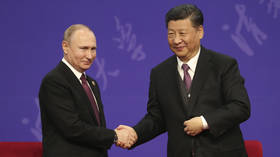Chinese stocks and currency slide

China’s yuan weakened sharply on Monday and the country’s stocks had their worst day since the 2008 global financial crisis, just a day after Chinese leader Xi Jinping secured his third term and undertook a major leadership reshuffle.
The renminbi hit a fresh 14-year low against the US dollar on the onshore market. The Hang Seng Tech Index, which tracks the 30 largest technology firms listed in Hong Kong, plunged almost 10%. Shares of tech giants Alibaba and Tencent both nosedived more than 11%, wiping a combined $54 billion off their stock market value.
The sharp selloff comes one day after the ruling Communist Party unveiled its new leadership for the next five years. A number of senior officials who have backed market reforms and opening up the economy were missing from the new top team. This sparked investor concerns about the future direction of the country and its relations with the US.
“It appears that the leadership reshuffle spooked foreign investors to offload their Chinese investment, sparking heavy selloffs in Hong Kong-listed Chinese equities,” Ken Cheung, the chief Asian forex strategist at Mizuho Bank, told CNN.
Meanwhile, some analysts note that in the last few months Beijing has taken less dramatic regulatory action against tech giants. “Some of the policy toward tech stocks has been softened,” Duncan Wrigley, the chief China economist at Pantheon Macroeconomics, told CNBC. “Overall, I think the stance of the leadership and the governments has become on balance more positive over the last year,” he added.
The market’s setback came despite the release of stronger-than-expected GDP data by the National Bureau of Statistics. The report showed the Chinese economy grew 3.9% in the third quarter from a year ago. Economists polled by Reuters had expected growth of 3.4%.
For more stories on economy & finance visit RT's business section













